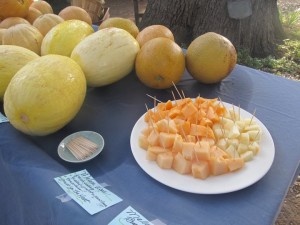Texas Farmers’ Market Bill 2013 FAQ
In the 2013 Texas legislative session, the Farm and Ranch Freedom Alliance worked to pass several bills to help small farmers and local food producers. The Cottage Foods Law and the DSHS Better Communications Bill are covered separate posts.
Click here to download a printable PDF version that covers both the Farmers’ Market Bill (HB 1382) and the DSHS Better Communications Bill (HB 1392). Both go into effect on September 1, 2013.
Farmers’ Market Bill (HB 1382)
The Farmers’ Market Bill has two sections: (1) sampling at farmers’ markets and farm stands, and (2) cooking demonstrations at farmers’ markets.
Sampling
 The provisions on sampling cover both farm stands and farmers’ markets. A farmers’ market is defined as “a designated location used primarily for the distribution and sale directly to consumers of food by farmers or other producers.”
The provisions on sampling cover both farm stands and farmers’ markets. A farmers’ market is defined as “a designated location used primarily for the distribution and sale directly to consumers of food by farmers or other producers.”
If you are providing samples of food at a location other than a farm or a farmers’ market, then you will have to comply with the regulations from the Department of State Health Services or your local health department.
To provide samples of food at a farm or farmers’ market, you must:
- Distribute the samples in a sanitary manner (for example, by providing toothpicks for individual servings);
- Have potable water available (for example, by having a jug of drinking water);
- Wash any produce intended for sampling with potable water to remove any visible dirt or contamination;
- When preparing the samples, either wear clean, disposable plastic gloves or observe proper hand washing techniques immediately before preparation;
- Use smooth, nonabsorbent, and easily cleaned (i.e. metal or plastic) utensils and cutting surfaces for cutting samples, or use disposable utensils and cutting surfaces;
- Keep samples of cut produce or other potentially hazardous foods at a temperature of 41 degrees or colder, or dispose of the samples within two hours after cutting or preparation.
Meat or poultry products must come from animals processed in compliance with the regulations for livestock processing (Texas Health & Safety Code Chapter 433).
You do not need to obtain a permit to provide samples at a farm or farmers’ market. As long as you meet the standards set out above, you may provide samples.
*** Update September 2013: Although the local health department officials acknowledged that no permit would be required during the negotiations on the bill, they have now changed their tune. Several local health departments are pointing to language in the section dealing with cooking demonstrations to claim that only sampling for “bona fide educational purposes” is exempt from permit requirements and fees. We are trying to address this mis-reading of the bill with the departments. ****
This law does not affect whatever permits you would normally be required to obtain to sell a food item. For example, if your local health department requires you to have a mobile food vending permit to sell cheese, you will still need to obtain that permit. But you will not need to obtain a separate permit to provide samples of your cheese.
Cooking Demonstrations at Farmers’ Markets
 For a farmers’ market to hold a cooking demonstration, it must:
For a farmers’ market to hold a cooking demonstration, it must:
- Have someone with a food manager’s license supervising the demonstration; and
- Comply with the requirements for a temporary food establishment (TFE) permit.
If the market wishes to distribute samples as part of the cooking demonstration:
- They can provide samples only, not full servings (i.e. you can’t serve a meal and call it a cooking demonstration);
- The samples must be disposed of within 2 hours of the beginning of the demonstration.
If the cooking demonstration is conducted by a farmers’ market for a “bona fide educational purpose,” it is exempted from the usual fees for a TFE permit.
Thank You’s
Thank you to Representative David Simpson and Senator Bob Deuell for sponsoring HB 1382. Thank you also to the hundreds of people who attended the committee hearings and FARFA’s lobbying days, or who wrote or called their legislators to help pass these important bills.
For more information, email info@farmandranchfreedom.org or call 254-697-2661.